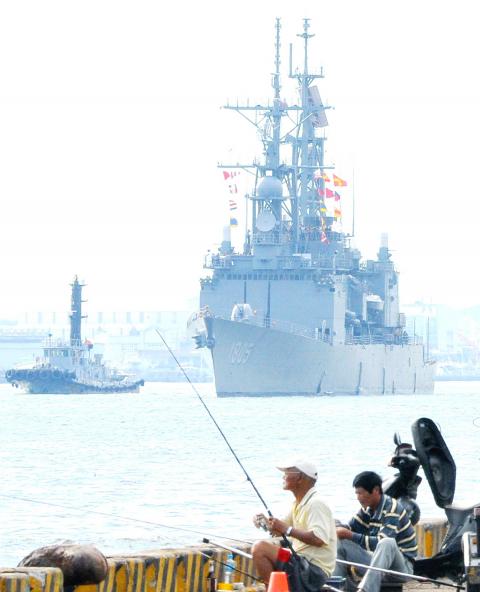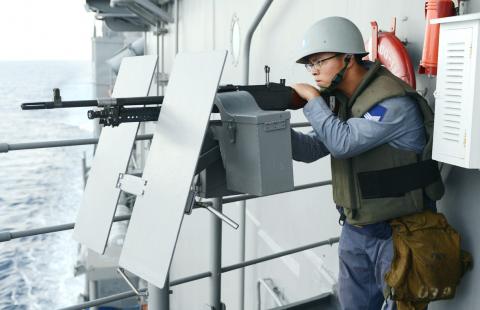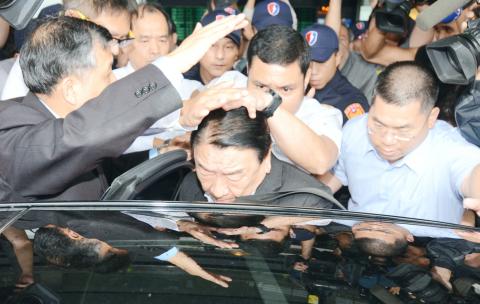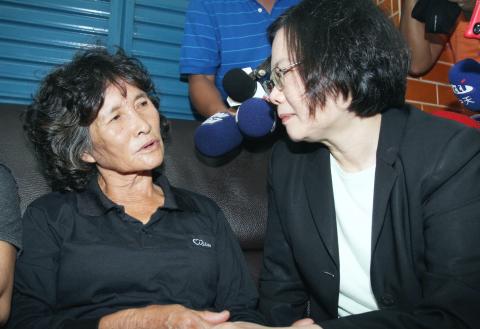|
Sanctions on
Philippines beefed up as row escalates
NOT ENOUGH: The government implemented eight
further sanctions as its deadline passed and described an apology by the
Philippine president as ‘unacceptable’
By Mo Yan-chih and Shih Hsiu-chuan / Staff reporters, with
agencies

A Kidd-class destroyer sails from
Greater Kaohsiung yesterday to take part in a joint exercise with the Coast
Guard Administration that begins today.
Photo: Huang Chih-yuan, Taipei Times

A sailor operates a machine gun
on a Kidd-class destroyer as it patrols the Taiwan Strait during a drill
yesterday.
Photo: Sam Yeh, AFP

Amadeo Perez, chairman of the
Manila Economic and Cultural Office, gets into a car at Taiwan Taoyuan
International Airport after his arrival yesterday.
Photo: CNA

Former Democratic Progressive
Party chairperson Tsai Ing-wen, right, yesterday visits the family of the
Taiwanese fisherman that was killed by Philippine Coast Guard personnel on
Thursday last week.
Photo: CNA
The administration of President Ma Ying-jeou
(馬英九) yesterday froze Philippine worker applications, recalled Taiwan’s
representative to the Philippines and asked the Philippine representative to
Taiwan to return to Manila amid a row over the killing of a Taiwanese fisherman.
The government launched eight retaliatory measures, including a travel alert on
the Philippines, in retaliation for the fatal shooting on Thursday last week.
Premier Jiang Yi-huah (江宜樺), in a scheduled press conference at 6pm, announced
the implementation of the eight retaliatory measures and said although the
government approved of an apology issued by Philippine President Benigno Aquino
III at about 4:30pm yesterday, it said the statement, which categorized the
death of 65-year-old Hung Shih-cheng (洪石成) as an “unintended” accident, was
unacceptable.
“The Kuang Ta Hsing No. 28 fishing boat is riddled with bullet holes and we
cannot accept the Philippine government’s argument that the killing was a
careless or unintended accident,” he said, while showing a copy of ballistics
analysis of the Taiwanese fishing boat.
The boat was fired upon by a joint patrol of the Philippine Coast Guard and the
Bureau of Fisheries and Aquatic Resources on Thursday last week in waters in
which the exclusive economic zones of Taiwan and the Philippines overlap.
Jiang said the government had launched a second wave of sanctions because the
Philippine government had failed to handle the incident promptly, while being
evasive in responding to Taiwan’s four demands — a formal apology over the
killing of Hung, compensation to Hung’s family, an investigation into the
incident and starting negotiations on a fisheries agreement.
“The Philippine government showed little sincerity that it wants to resolve the
issue and remained evasive. The eight measures have been implemented as planned
and the government will continue to protest in the strongest terms,” he said.
The eight measures proposed yesterday morning by the government after a national
security meeting, are issuing a travel warning that discourages Taiwanese from
traveling to the Philippines, the suspension of high-level meetings at the World
Health Assembly, the suspension of economic exchanges, the suspension of
cooperation on agriculture and fisheries, the suspension of cooperation on
technology, the suspension of negotiations on air space rights, the suspension
of the visa-free program for Philippine nationals and that Taiwan would hold
military exercises in disputed waters.
The first wave of sanctions — the suspension of the hiring of Philippine
workers, recalling Taiwan’s representative to the Philippines and sending the
Philippine representative to Taiwan back to Manila — also took effect yesterday
after the Philippine government failed to meet the Ma administration’s demands
by the president’s deadline.
Jiang said the National Security Council would set up a response team in
cooperation with the related government agencies to oversee the implementation
of the 11 sanctions and the government may also consider more sanctions unless
the Philippine government offers an acceptable response.
Council of Labor Affairs Minister Pan Shih-wei (潘世偉) said the freezing of
applications for work permits from Philippine nationals is indefinite, while
adding that the measure would not affect Philippine nationals already working in
Taiwan.
Jiang said Taiwan recalled representative to the Philippines Raymond Wang (王樂生)
to Taipei last night and the Philippines representative to Taiwan, Manila
Economic and Cultural Office (MECO) Managing Director Antonio Basillio, has been
told to leave Taiwan today.
Coast Guard Administration Minister Wang Jinn-wang (王進旺) said his agency has
been patrolling the overlapping economic zones to protect the rights and safety
of Taiwanese fishermen and the patrols would continue.
Following a national security meeting held on Saturday to discuss implementing
sanctions against the Philippines, Ma held a second meeting yesterday morning
following the return of Basilio with messages from Manila on Tuesday night.
Presidential Office spokesperson Lee Chia-fei (李佳霏) said Ma condemned the
Philippine government for its lack of sincerity in meeting the Taiwanese
government’s demands by the deadline and instructed the Cabinet to implement the
additional sanctions immediately.
“The Philippine government did not grant full authorization [to its envoy], it
lacks sincerity and shows a wayward stance in its handling of the incident.
President Ma is strongly dissatisfied with its reckless and perfunctory
response,” Lee said.
Separately yesterday, Minister of Foreign Affairs David Lin (林永樂) rejected a
request for a meeting from MECO Chairman Amadeo Perez, who arrived in Taiwan at
about 1pm.
At 2:45pm, ministry spokesperson Anna Kao (高安) told a press conference that Lin
had refused to meet with Perez because the ministry has confirmed that “upon
Perez’s arrival in Taiwan,” he did not have the “proper authorization” from
Aquino.
After the press conference, Malacanang Palace spokesman Edwin Lacierda told a
press conference in Manila that Aquino was sending his “personal representative”
to Taipei with a letter of apology.
The representative “will convey his and the Philippine people’s deep regret and
apologize to the family of [Hung Shih-cheng], as well as to the people of
Taiwan, over the unfortunate and unintended loss of life.”
At the press conference, Lacierda urged Taiwan not to implement its threatened
sanctions and to reverse its decision to ban the hiring of Philippine workers.
“We appeal to the people of Taiwan not to involve our nationals there,” Lacierda
said. “We appeal for calm. We appeal for sobriety.”
Lacierda said Perez was scheduled to meet the victim’s family today. However,
earlier yesterday, Hung’s family in Siaoliouciou (小琉球), Pingtung County, said
that they would not welcome a visit from Perez because the Philippine government
has declined to offer them a formal apology.
Hung Tzu-ching (洪慈綪), the eldest daughter, said her family were indignant at the
Philippines after watching the joint press conference in the early hours of
yesterday morning on TV because Basilio has declined to apologize.
She said they would shut the door if Perez visited them.
Perez traveled to the Ministry of Foreign Affairs at 5:50pm yesterday and
Benjamin Ho (何登煌), director-general of the ministry’s Department of East Asian
and Pacific Affairs, met with him for 40 minutes to check the documents he had
brought from Manila to determine whether he was properly authorized by Aquino.
Before Perez left the ministry, he told reporters that he was a “personal
representative” of Aquino, who has directed him to extend “our heartfelt
apologies to the family of the fisherman … and to apologize to the people of
Taiwan for this unfortunate incident.”
Asked if the apology was a government-to-government apology, Perez said it was
addressed to “the people of Taiwan.”
|
![]()
![]()
![]()